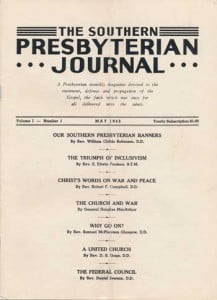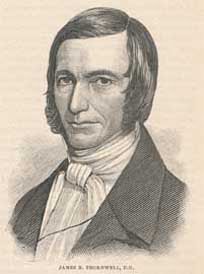 In the early years of the second World War, the Japanese invasion of China forced missionaries from the Chinese field, including medical missionary L. Nelson Bell. Returning to the States, Bell found his Southern Presbyterian denomination in spiritual decline and slowly falling over into modernism and unbelief. As Dr. Bell settled in the Asheville, N.C. area, he joined with other like-minded men who had been discussing the denomination’s problems and who, since 1936, had been planning to establish a magazine as a voice for sound Biblical principles.
In the early years of the second World War, the Japanese invasion of China forced missionaries from the Chinese field, including medical missionary L. Nelson Bell. Returning to the States, Bell found his Southern Presbyterian denomination in spiritual decline and slowly falling over into modernism and unbelief. As Dr. Bell settled in the Asheville, N.C. area, he joined with other like-minded men who had been discussing the denomination’s problems and who, since 1936, had been planning to establish a magazine as a voice for sound Biblical principles.
May 2, 1942 marks the first issue of The Southern Presbyterian Journal. Authors for that first issue included Dr. William Childs Robinson, Rev. E. Edwin Paulson, Rev. Robert F. Campbell, General Douglas MacArthur, Rev. Samuel McPheeters Glasgow, Rev. D.S. Gage and Rev. Daniel Iverson.
William Childs Robinson wrote the lead article, in which he set out four “banners” or defining principles of historic Presbyterianism, principles which had been formerly emulated among Southern Presbyterians. These four banners were loyalty to Christ as King, the Bible as the Word of God written, the Westminster Standards as an expression of sound doctrine, and lastly, the banner of the Great Commission. These were the values that the new magazine espoused as it sought to call the denomination back to faithfulness.
 For forty-five years, the Journal faithfully proclaimed these values. In 1959, L. Nelson Bell stepped down as editor and was succeeded by Dr. G. Aiken Taylor. At that same time, the word Southern was dropped from the magazine’s name, reflecting Dr. Taylor’s wider focus on the breadth of conservative American Presbyterianism. And within a few more years, The Presbyterian Journal was increasingly involved in the events leading up to the formation of the Presbyterian Church in America, in December of 1973. The Presbyterian Journal continued on for another fourteen years, finally closing with the March 18, 1987 issue.
For forty-five years, the Journal faithfully proclaimed these values. In 1959, L. Nelson Bell stepped down as editor and was succeeded by Dr. G. Aiken Taylor. At that same time, the word Southern was dropped from the magazine’s name, reflecting Dr. Taylor’s wider focus on the breadth of conservative American Presbyterianism. And within a few more years, The Presbyterian Journal was increasingly involved in the events leading up to the formation of the Presbyterian Church in America, in December of 1973. The Presbyterian Journal continued on for another fourteen years, finally closing with the March 18, 1987 issue.
Click here to download a PDF file of that first issue of The Southern Presbyterian Journal.
Words to Live By: In the opening editorial of that issue, L. Nelson Bell wrote:
The civilization of which we are a part is perched precariously on the edge of an abyss. This is obvious to all, whether in or outside of the Church. The tragedy is that, in part, the Christian Church is to blame.
It is to blame in so far as it has left its God-given task of preaching the Gospel of salvation from sin through the Lord Jesus Christ.
It is to blame in so far as it has turned from faith in, and the preaching of, the Bible as truly and wholly the Word of God, condoning preaching and teaching calculated to question or destroy this precious faith.
It is to blame where it has substituted for the Gospel of redemption a programme of social reform.
It is to blame to the extent to which it has stepped out of its spiritual role, to meddle as the Church, in political and economic matters and affairs of State.
It is to blame where, as has so often been the case, the Gospel message has been diluted and made pleasant to the taste of unregenerate man; denying the fact of, and the heinousness of sin, and the certain doom of the unrepentant sinner.
But despite these failures of the Church, a return to a faithful ministry of the Truth can yet, by the power of the Holy Spirit, provide the spiritual and moral stamina which is essential for world stabilization. To this spiritual awakening and revival THE JOURNAL is dedicated.

